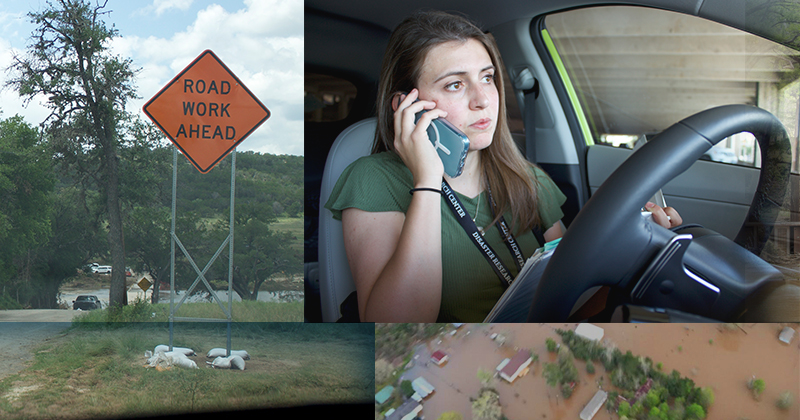


Texas flood aftermath
Photos courtesy of Julie Elliott | Photo illustration by Jeffrey C. Chase July 28, 2025
UD graduate student brings back difficult lessons from Texas flood disaster
“Shocking and sobering” — that’s how University of Delaware graduate student Julie Elliott described Kerrville, Texas, after the devastating flooding on July 5.
“I have seen disaster damage and debris, but this was different than all I had ever seen before,” said Elliott, who previously worked as an emergency manager in North Texas. “Somewhere around 100 miles of river is included in search efforts; this is simply staggering.”
Elliott is completing her doctorate at UD’s Disaster Research Center, the oldest center in the world focused on the social science of disasters and the development of leaders in disaster preparedness, response and recovery. She deployed to Kerr County a few days after the flooding to learn how emergency agencies and community-based organizations were coordinating response efforts. UDaily connected with Elliott about her experience.
Q: Can you describe what the disaster responders were dealing with on the ground?
Elliott: Community members and responders had to deal with more flash floods that brought search operations to a halt and — on days without continued rain — extremely hot temperatures. Further, this is a relatively rural part of the state, so they faced difficulty accessing certain points along the river. The enormous amount of debris has made search operations difficult. I’ve seen reports of responders encountering snakes (and other Texas wildlife, I’m sure).
Q: Did anything surprise you about the response efforts?
Elliott: I was surprised to see how many first responders from across the state there were. Texas is enormous. I was born and raised in North Texas, about five hours from Kerr County. I saw fire trucks and ambulances from jurisdictions close to where I live. The outpouring from the broader state and nation was pretty incredible. Twenty-six states have deployed assets to Texas to assist. At one of the sites I visited, I met an emergency manager from New Jersey; when he saw that I was from Delaware, he immediately asked if I was a Blue Hen.
Q: What aspects of this disaster are you studying?
Elliott: I am focused primarily on disaster management networks, specifically in understanding the dynamics of coordination and collaboration, what works well and what can be improved. I wanted to see what organizations were present and how they worked together to solve problems. I was only there for a few days, but I was able to observe so much in that time. I visited key sites where multiple organizations were collaborating, including an emergency operations center, disaster recovery center, mass feeding sites and volunteer reception centers.
Q: Was there a particular moment that really stayed with you?
Elliott: At one point, I walked into a destroyed mobile home park. As I walked near the river and looked back from where I had walked, you could see the scope of damage caused by the rising water. As I looked to my left and right, the only evidence of homes was the concrete slabs they had sat on. There were a few crumbled chassis, barely recognizable. When you see this, all you can think is that it seems impossible that someone could have survived within that trailer, and you hope there was no one in it by the time it was swept away.
Q: How do you separate yourself from the emotional impact these communities have experienced?
Elliott: In a way, you can’t separate it. I am a new mom — my son just turned 10 months old — and this has changed my perspective; it’s hard not to think about my family when I think about the families who have lost so much. That said, when I see and hear about the immeasurable loss experienced in these communities (and communities around the U.S., given the number of visitors to the area), I am driven to critically examine the incident and identify how we can improve disaster response and recovery for the long term. The emotion is a motivator.
I think it is also important for anyone doing quick-response research to have a strong support system, whether that is family, friends or other emotional/spiritual care resources. I am grateful to have had the full support of the faculty at the Disaster Research Center, along with logistical and emotional support from my family who live in Central Texas.
Q: Has this experience further shaped your career interests?
Elliott: As my first true exposure to quick-response disaster research, I learned so much and feel empowered to do research like this in the future. This fall, I will join the faculty at the University of North Texas Department of Emergency Management and Disaster Science as a professional-track lecturer. Among the courses I will be teaching is Methods in Emergency Management. I firmly believe we can reduce the impacts of disasters and increase the effectiveness of response/recovery operations when we properly research events and present results that include actionable next steps.
Q: What is the next step for your research?
Elliott: Certainly, I have a mountain of data to clean and analyze; most of my data was collected observationally or via documents and photos. Ultimately, the data will be incorporated into my dissertation. I also plan to share my findings with the organizations that graciously allowed me to observe their work, in addition to presenting at Texas emergency management conferences and in publications.
Contact Us
Have a UDaily story idea?
Contact us at ocm@udel.edu
Members of the press
Contact us at mediarelations@udel.edu or visit the Media Relations website

